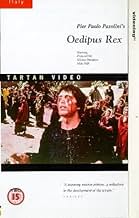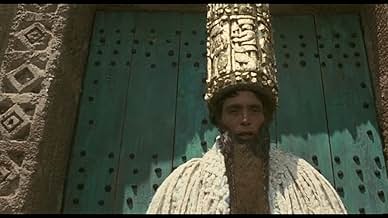IMDb रेटिंग
7.2/10
7.3 हज़ार
आपकी रेटिंग
परित्याग से बचाया और राजा और रानी द्वारा अपनाया गया, ओडिपस अभी भी एक भविष्यवाणी से प्रेतवाधित है - वह अपने पिता की हत्या करेगा और अपनी माँ से शादी करेगा.परित्याग से बचाया और राजा और रानी द्वारा अपनाया गया, ओडिपस अभी भी एक भविष्यवाणी से प्रेतवाधित है - वह अपने पिता की हत्या करेगा और अपनी माँ से शादी करेगा.परित्याग से बचाया और राजा और रानी द्वारा अपनाया गया, ओडिपस अभी भी एक भविष्यवाणी से प्रेतवाधित है - वह अपने पिता की हत्या करेगा और अपनी माँ से शादी करेगा.
- निर्देशक
- लेखक
- स्टार
- पुरस्कार
- 4 जीत और कुल 4 नामांकन
Giovanni Ivan Scratuglia
- Sacerdote
- (as Ivan Scratuglia)
Laura Betti
- Jocasta's Maid
- (बिना क्रेडिट के)
Pier Paolo Pasolini
- High Priest
- (बिना क्रेडिट के)
Isabel Ruth
- Jocasta's Maid with a Lamb
- (बिना क्रेडिट के)
फ़ीचर्ड समीक्षाएं
one of films who remands. the rules of Greek tragedy. the limits of interpretation. the manner to use the myth as contemporary mirror. the art of Piero della Francesca. the conflict between past and present. a film of actors. because each trace of acting defines not the vision of Pasolini about the fate of king from Thebes but its search of truth. the truth - basis of all. Edipo re impress. for atmosphere, for costumes and the use of myth.the eyes of Franco Citti. the presence of Silvana Mangano. the first scenes who are parts from a possible Visconti. the end as warning about the price of fight against yourself. Edipo re is support for reflection. not a new version of well known myth because the important details of myth are insignificant. not example of high art. because it is far to be a show. it is only exploration of meanings. and the sketch about different forms of pride and sacrifice. looking for authenticity. precise definition of life.
I was very impressed, I really do think that this is a masterpiece! Pasolini used the original text of Sophocles' tragedy, so the story is tightly knotted, which gives the whole film a tangible urgency. There are, apart from the at times stunning amounts of extra's, only two main actors. Silvana Mangano as Giocasta only appears halfway through the movie and has hardly any lines, but she plays her part impressively by her facial expressions and her stature. Franco Citti as Oedipus is the absolute core of the movie, he dominates the screen with his rugged and fascinating face, he laughs and cries and screams, and all the time stays totally convincing as the self-assured ego-tripping hero, who gradually slips into the awareness that his whole life is based on unspeakable crimes and that he is toyed with by the gods and fate. Some reviewers opinioned he acted way over the top, but I assume it was all deliberately so orchestrated by Pasolini, emphasizing the origin of a Greek tragedy that had to be delivered from an open-air rostrum to a distant audience.
The locations are dazzlingly beautiful, Morocco in fact, not Greece, but it works wonderfully well, as do the weird costumes which look like they were sowed and tinkered by the crew or the many locals themselves, but with the amazing effect of something out of a dream (or nightmare). The musical score is extremely subtle, at many times just the soft bleak rhythmic blows of a single drumstick, with an almost haunting effect.
Strangely enough the prologue and epilogue are set in modern times, this doesn't add anything as far as I'm concerned, but as it was it gives us yet some other beautiful images, with the same vast green lawns and waving tree-tops in the opening and closing scene, completing a perfect circle.
The locations are dazzlingly beautiful, Morocco in fact, not Greece, but it works wonderfully well, as do the weird costumes which look like they were sowed and tinkered by the crew or the many locals themselves, but with the amazing effect of something out of a dream (or nightmare). The musical score is extremely subtle, at many times just the soft bleak rhythmic blows of a single drumstick, with an almost haunting effect.
Strangely enough the prologue and epilogue are set in modern times, this doesn't add anything as far as I'm concerned, but as it was it gives us yet some other beautiful images, with the same vast green lawns and waving tree-tops in the opening and closing scene, completing a perfect circle.
Pasolini tells the drama of a man who knows his destiny from the beginning but does not accept the awareness of evil, tries to escape an atrocious future, but is inevitably entangled in it. The director uses Oedipus, of a classic archetype, to tell the human condition, the inadequacy of those who know they must die, but are unable to accept it.
The Moroccan setting that hides a fantasy Greece, between desert and villages of shepherds, mountains, cities built with clay and destroyed by plagues, is wonderful. A film written in images, dialogues reduced to the essentials, use of captions as in the silent era, intense photography and - for the first time in a Pasolini film - use of color that renders the ocher chromatism of the desert well.
The film have some substantial flaws, especially the storytelling. But the great Pasolini-style shine's brightly throughout the film and Franco Citti is just amazing as Edipo himself.
The Moroccan setting that hides a fantasy Greece, between desert and villages of shepherds, mountains, cities built with clay and destroyed by plagues, is wonderful. A film written in images, dialogues reduced to the essentials, use of captions as in the silent era, intense photography and - for the first time in a Pasolini film - use of color that renders the ocher chromatism of the desert well.
The film have some substantial flaws, especially the storytelling. But the great Pasolini-style shine's brightly throughout the film and Franco Citti is just amazing as Edipo himself.
Sophocles' Oedipus Rex is adapted well for the foreign screen. Pasolini, better known for the controversial Salo; 120 Days of Sodom, has kept the intensity level to a minimum while still presenting the perverse qualities for which he would be known for. If you don't know the story (like who doesn't) read the play before seeing the movie - there tends to be a shortage on literature freaks these days. Beautifully filmed, Oedipus Rex begins in modern times, continues sometime BC, and finally ends back in the 20th century; thus presenting a sociological thesis for the viewer. The acting is a bit hammy (seeing Oedipus with a mad streak can be over the top) although the characters are developed well and recite their lines as if on stage. My only complaint is the subtitles seem to blend in with the scenery --- white subtitles against a white background. Therefore, this flaw makes it difficult to enjoy some scenes, and Pasolini's poetry is usually superb. Nevertheless, it's still a great film and is worth a look, especially by people with preconceived hatred for Pasolini's later work -and there's definitely a lot out there.
The early and late sequences filmed within Italy are some of the best Pasolini has filmed. His confident and measured pace as well as his eye for composition and love of such basics as trees and sky and grass are a joy to behold. As for the rest, it can be very taxing. The Moroccan desert and mountain scenery is wondrous and the placing and movement of large numbers of peoples impressive but there is a lot of ponderous and somewhat languorous adherence to this titular tale. The associated screaming and passionate pondering as to the ins and outs of past events and just who did what with whom and for why become rather wearing.
क्या आपको पता है
- ट्रिवियाFirst part of Pier Paolo Pasolini's "Mythical Cycle" also including Teorema (1968), Porcile (1969) and Medea (1969).
- कनेक्शनEdited into Dias de Nietzsche em Turim (2001)
टॉप पसंद
रेटिंग देने के लिए साइन-इन करें और वैयक्तिकृत सुझावों के लिए वॉचलिस्ट करें
- How long is Oedipus Rex?Alexa द्वारा संचालित
विवरण
बॉक्स ऑफ़िस
- दुनिया भर में सकल
- $2,364
- चलने की अवधि1 घंटा 44 मिनट
- पक्ष अनुपात
- 1.85 : 1
इस पेज में योगदान दें
किसी बदलाव का सुझाव दें या अनुपलब्ध कॉन्टेंट जोड़ें


































